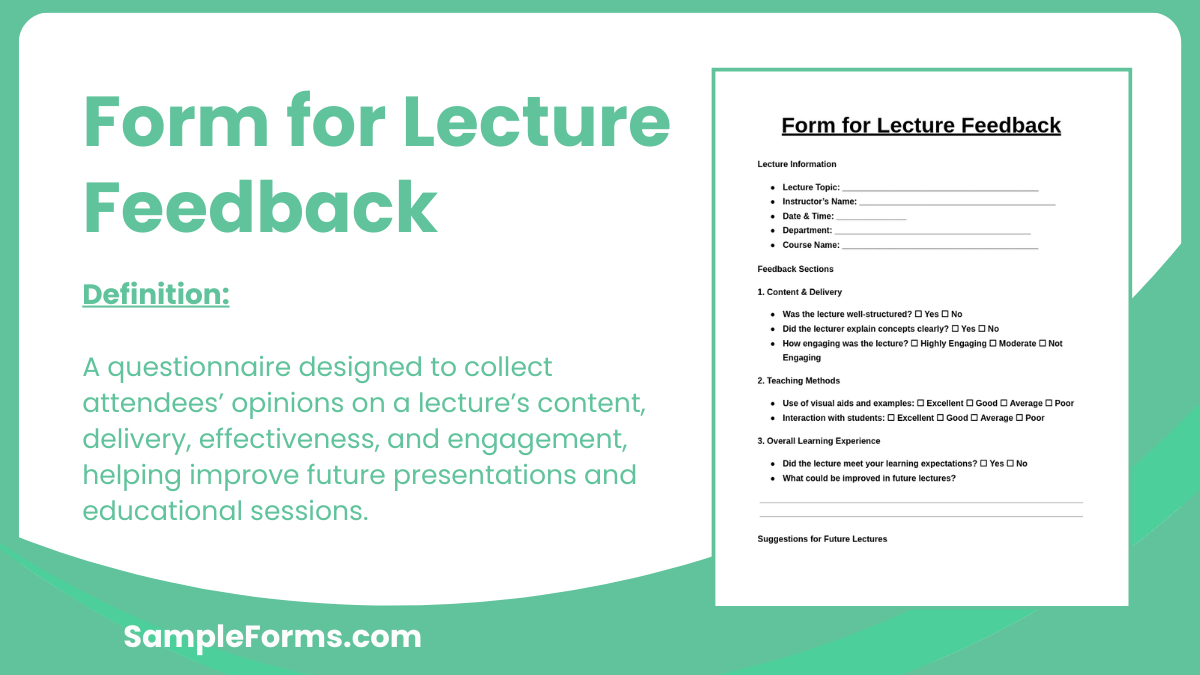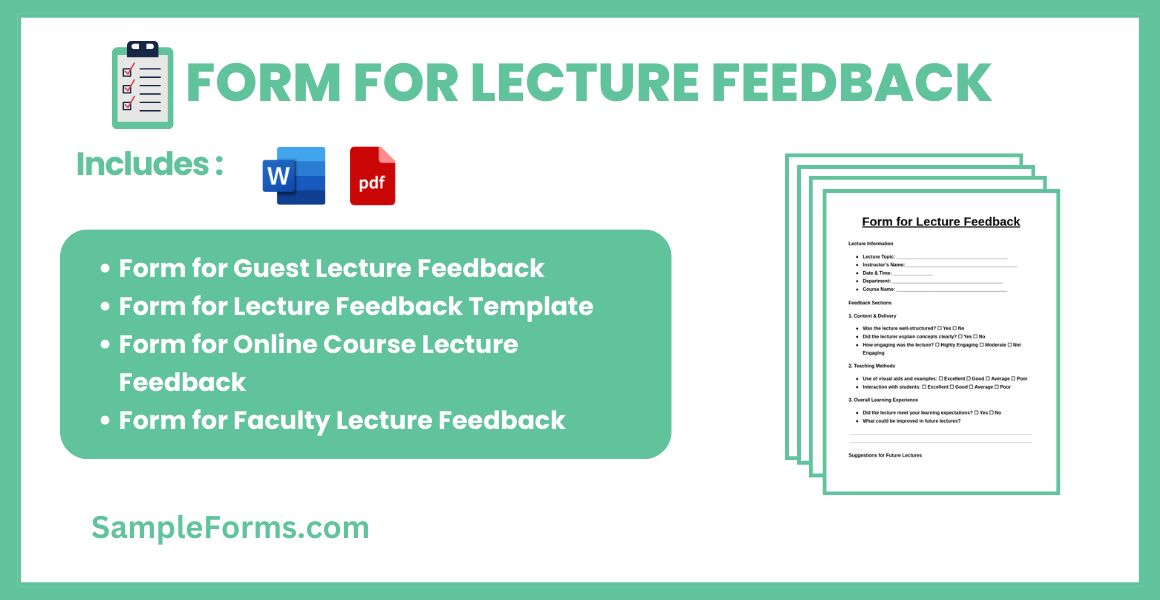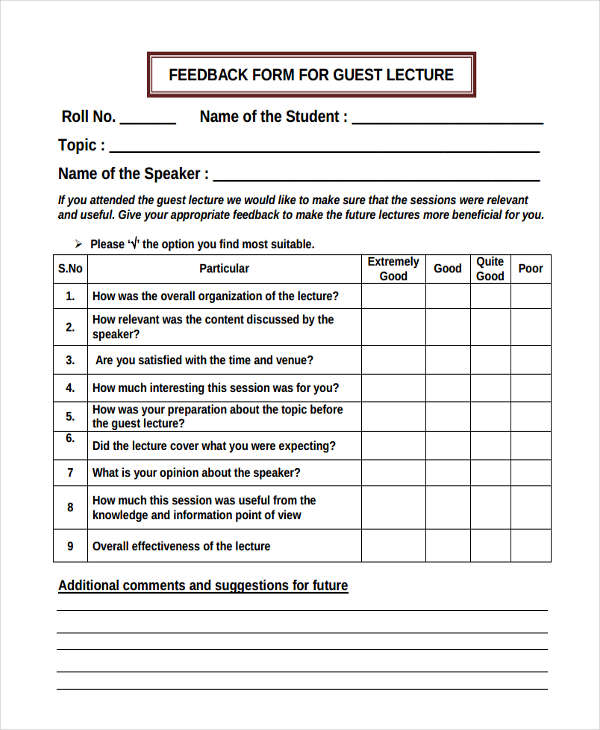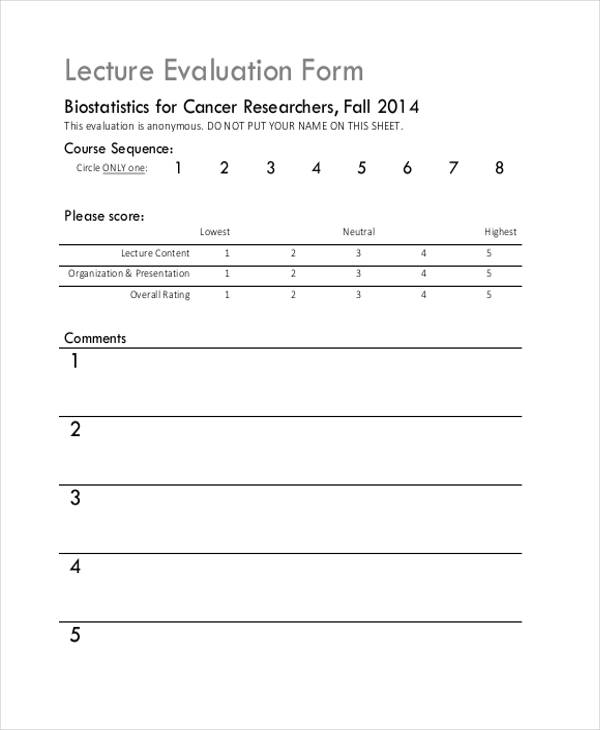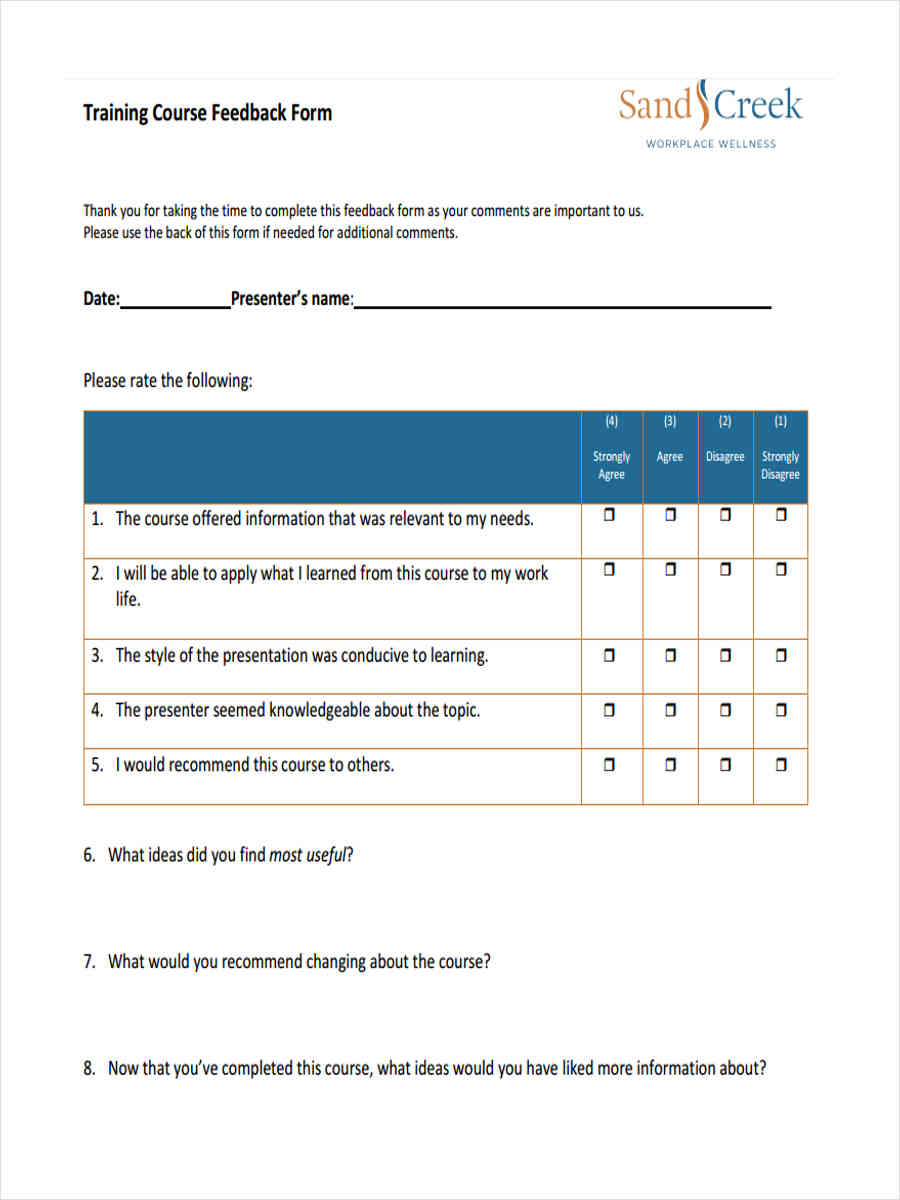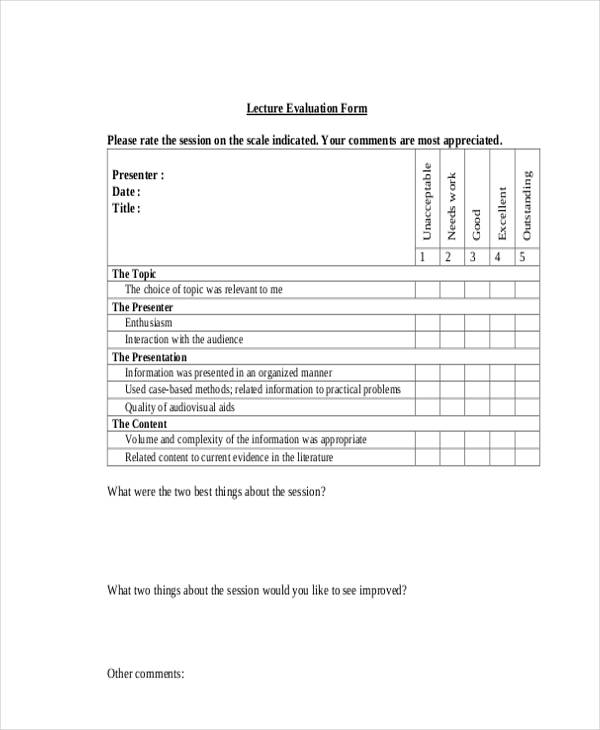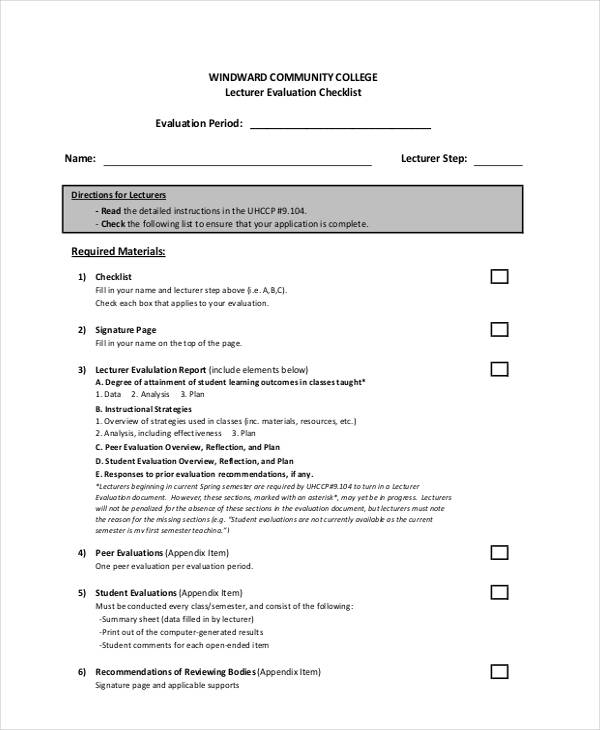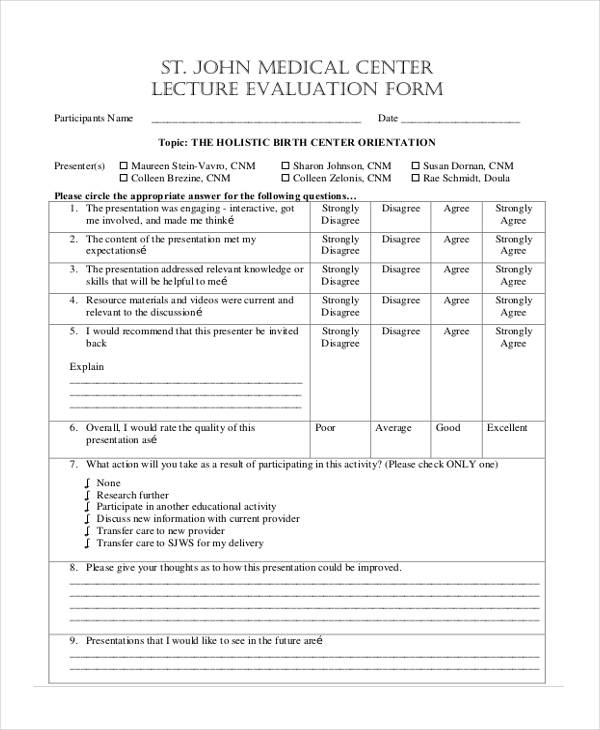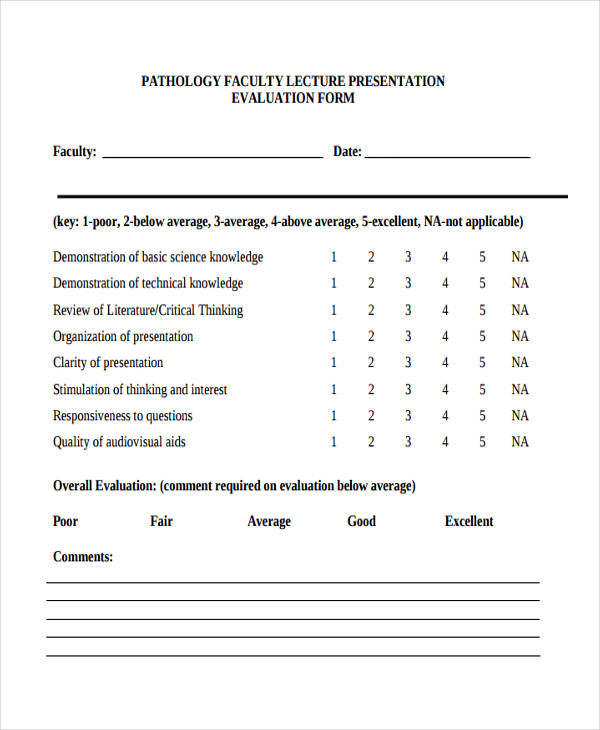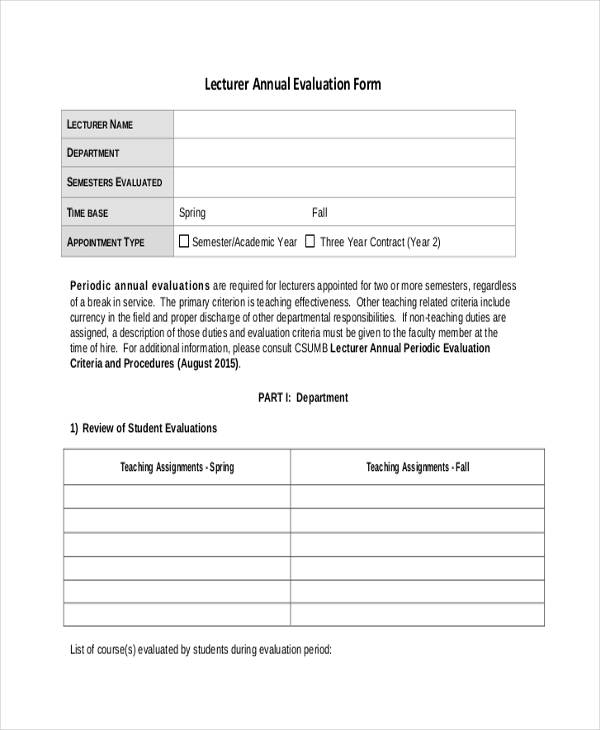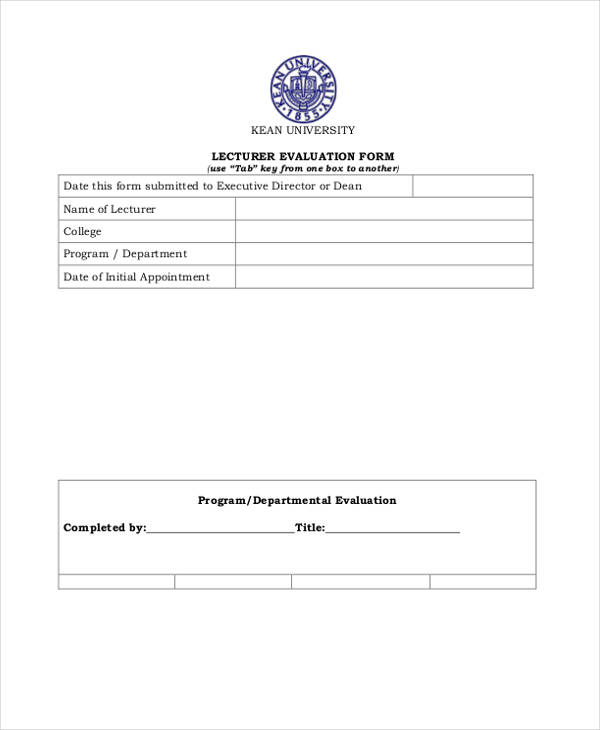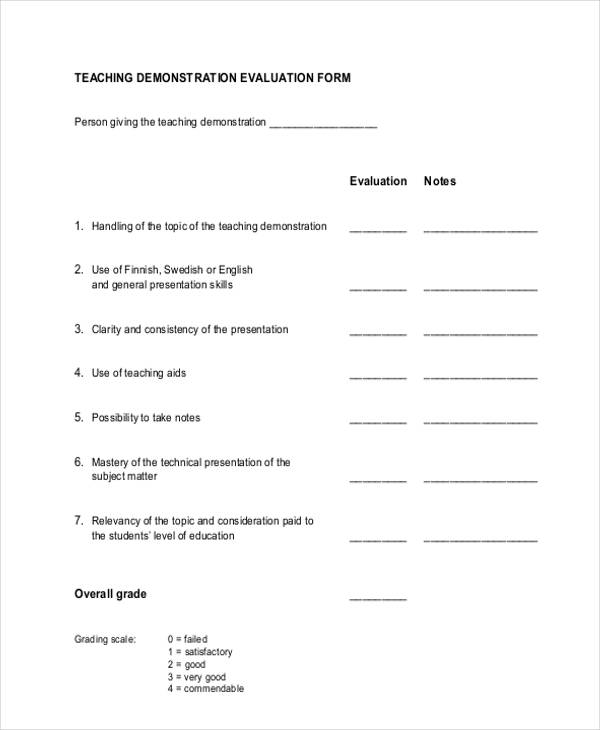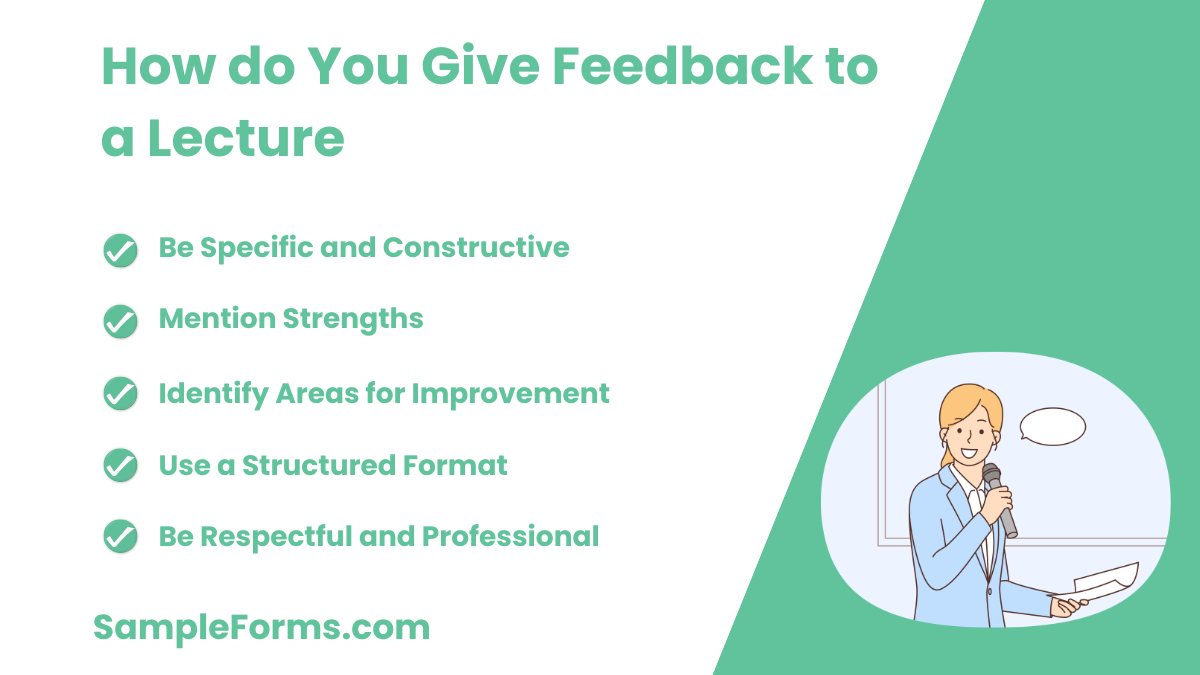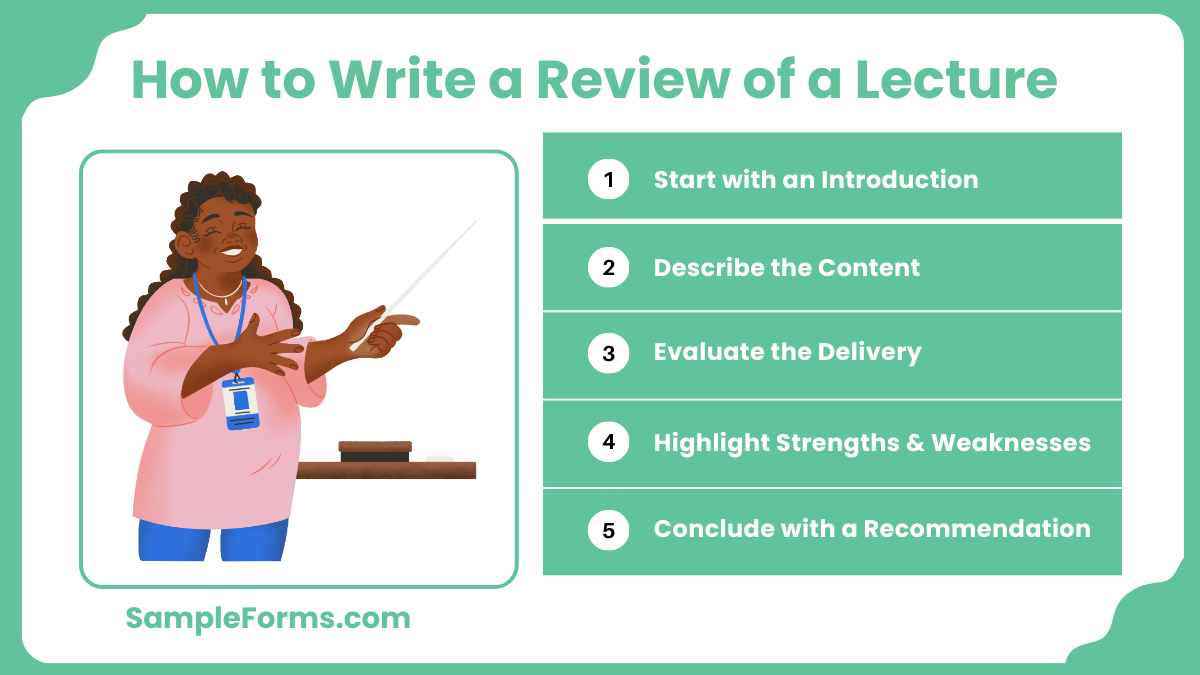A Form for Lecture Feedback allows students and attendees to evaluate lectures, providing essential insights for improvement. A well-structured Feedback Form ensures instructors receive constructive input on teaching effectiveness, content clarity, and engagement. Educators can use this feedback to refine delivery methods, enhance interaction, and improve overall learning experiences. Whether for academic settings, workshops, or corporate training, a well-designed feedback form is crucial for continuous improvement. This guide covers essential elements, formatting tips, and sample templates to help create a structured and effective lecture feedback form that enhances teaching quality.
What is Form for Lecture Feedback?
A Form for Lecture Feedback is a structured document used to assess the effectiveness of a lecture. It collects opinions from attendees about content clarity, instructor delivery, and engagement. This form helps educators and trainers enhance their teaching methods by identifying areas for improvement. A well-crafted feedback form includes rating scales, open-ended questions, and specific feedback sections to ensure detailed and useful responses. It is commonly used in universities, corporate training, and workshops to track progress and ensure continuous improvement in instructional quality.
Form for Lecture Feedback Format
Lecture Information:
- Topic: [Lecture Title]
- Lecturer’s Name: [Full Name]
- Date of Lecture: [Insert Date]
Feedback Questions:
- Was the lecture content relevant and useful? [Yes/No]
- Did the lecturer explain concepts clearly? [Yes/No]
- How would you rate the lecture’s engagement level? [Excellent/Good/Average/Poor]
- What was the most valuable part of the lecture? [Open Response]
- What improvements would you suggest? [Open Response]
Overall Rating:
- Content Quality: [Excellent/Good/Average/Poor]
- Presentation Style: [Excellent/Good/Average/Poor]
Additional Comments:
[Provide Space for Detailed Comments]
Reviewer’s Acknowledgment:
Reviewer Name: ___________ Date: ___________
Form for Guest Lecture Feedback
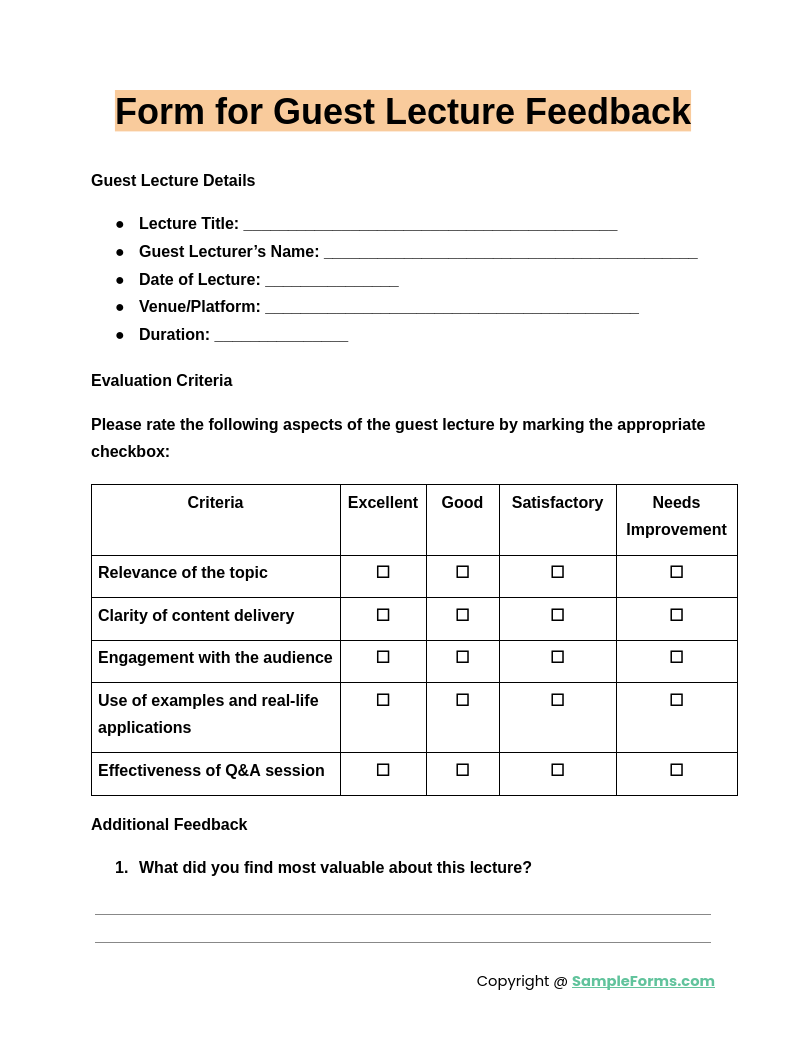
A Form for Guest Lecture Feedback gathers insights on guest speakers’ effectiveness, content relevance, and engagement. Similar to a Real Estate Feedback Form, it evaluates audience satisfaction, ensuring better speaker selection and improved future lecture experiences.
Form for Lecture Feedback Template
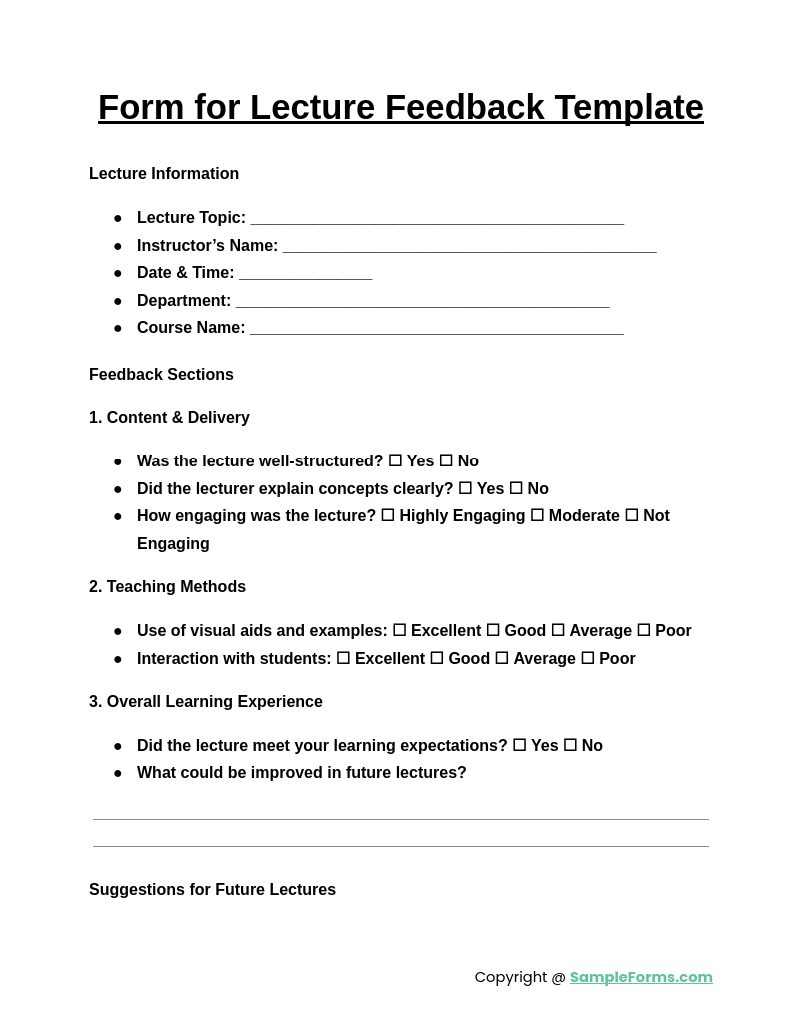
A Form for Lecture Feedback Template provides a standardized structure for collecting lecture evaluations. Like a Camp Feedback Form, it helps assess overall experience, content delivery, and engagement, ensuring continuous improvement in educational sessions and training programs.
Form for Online Course Lecture Feedback
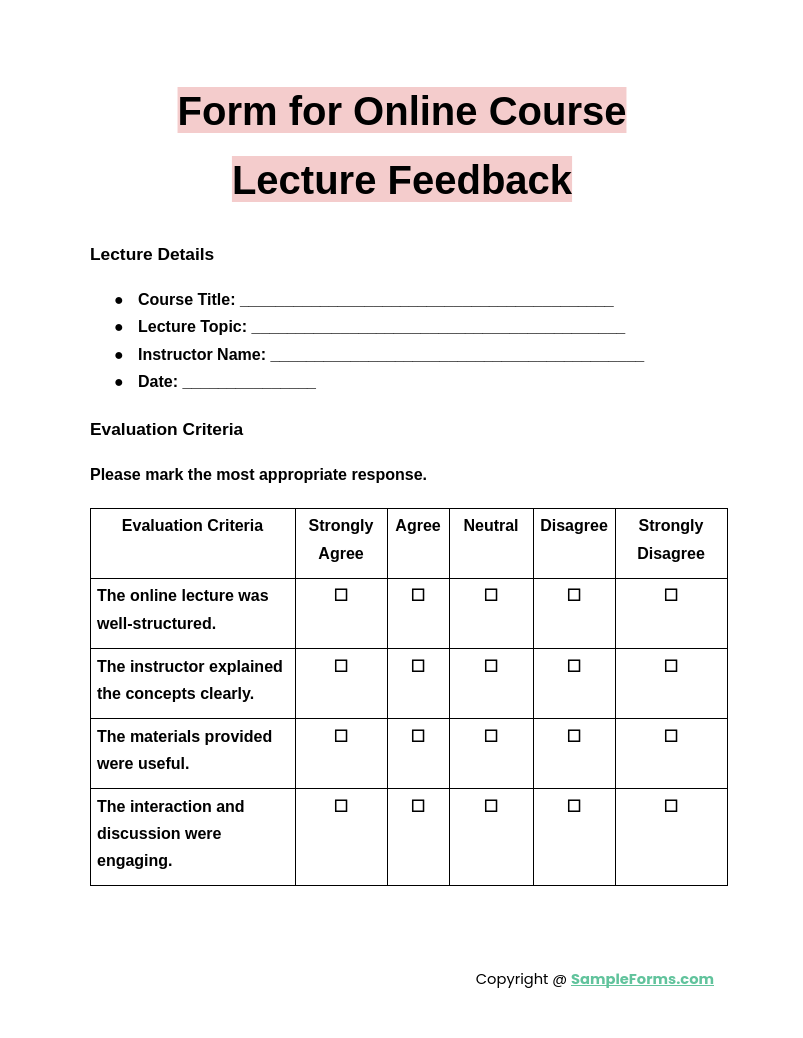
A Form for Online Course Lecture Feedback measures students’ experiences in virtual learning environments. Similar to Retail Customer Feedback, it identifies strengths, areas for improvement, and course effectiveness, ensuring an enhanced online learning experience.
Form for Faculty Lecture Feedback
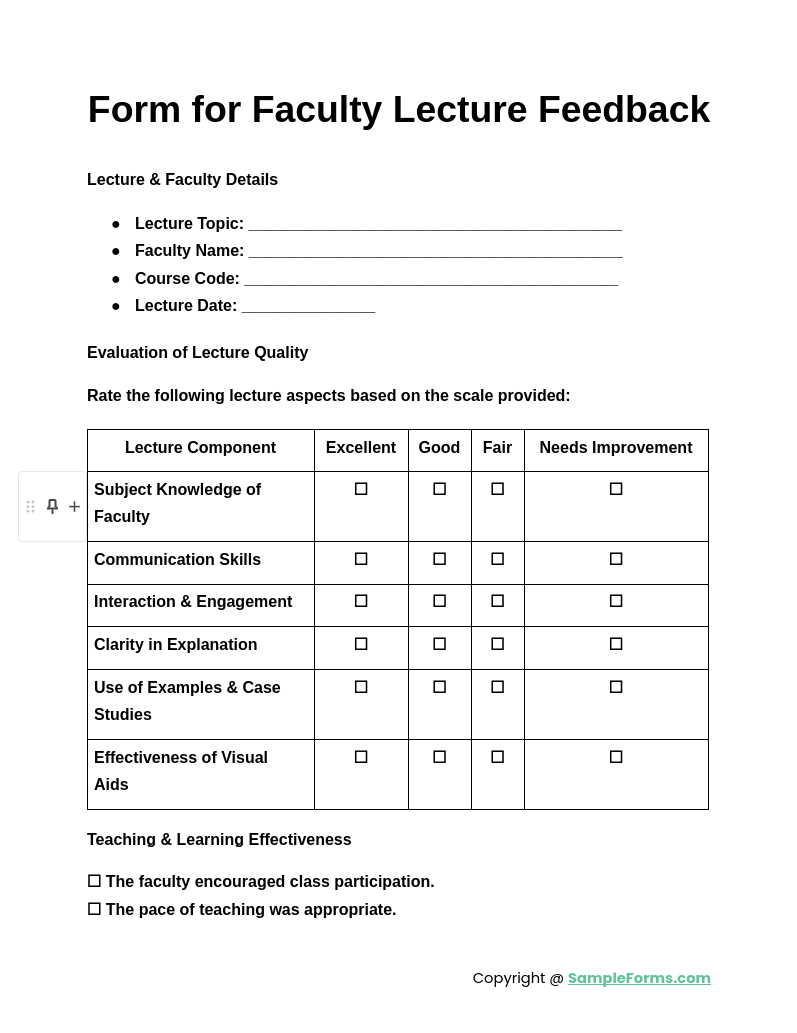
A Form for Faculty Lecture Feedback evaluates teaching effectiveness, course content, and student engagement. Like a Performance Feedback Form, it provides structured insights for faculty development, ensuring continuous teaching excellence and enhanced student learning outcomes.
Browse More Forms for Lecture Feedback
Guest Lecture Feedback Form
Lecture Evaluation Form in PDF
Training Course Lecture Feedback Form
Blank Lecture Evaluation Sample
Lecturer Evaluation Checklist Feedback Form
Free Medical Lecture Evaluation Feedback Form
Faculty Lecture Presentation Feedback Form
Lecturer Annual Evaluation Feedback Form
University Lecturer Evaluation Feedback Form
Lecturer Teaching Demonstration Evaluation Form
How do you give feedback to a lecture?
Providing effective feedback helps improve lecture quality, engagement, and learning outcomes. A structured approach ensures clarity and constructive criticism. Steps include:
- Be Specific and Constructive: Focus on content delivery, clarity, and engagement, similar to a Medical Feedback Form, which evaluates patient care.
- Mention Strengths: Highlight what was effective, such as clear explanations, engaging discussions, or useful examples.
- Identify Areas for Improvement: Suggest ways to enhance content, interaction, or teaching methods.
- Use a Structured Format: Organize feedback into sections covering presentation style, material clarity, and student engagement.
- Be Respectful and Professional: Keep feedback objective and constructive to support continuous improvement.
How to create a course feedback form?
A well-structured course feedback form ensures valuable insights from students, helping educators refine course content and teaching methods. Essential steps include:
- Define Objectives: Establish clear goals, similar to a Photography Feedback Form, which gathers structured insights on image composition and quality.
- Include Essential Sections: Cover instructor effectiveness, content relevance, and student engagement.
- Use a Mix of Question Types: Combine multiple-choice, rating scales, and open-ended questions for detailed feedback.
- Ensure Anonymity: Encourage honest responses by keeping feedback confidential.
- Analyze and Implement Changes: Review feedback regularly to make necessary improvements.
What questions should be included in a feedback form?
Effective feedback forms include a variety of questions to assess lecture quality. The following key questions should be included:
- How clear was the lecture content? Similar to a Library Feedback Form, assess how well the material was structured and presented.
- Was the instructor engaging? Evaluate their ability to maintain interest and encourage participation.
- Did the lecture meet learning objectives? Ensure content aligns with educational goals.
- What could be improved? Collect constructive feedback on content, pace, or delivery.
- Would you recommend this lecture to others? Measure overall satisfaction and relevance of the lecture.
What do you say after a lecture?
Expressing appreciation and summarizing key takeaways enhance engagement and reinforce learning. Follow these steps when responding after a lecture:
- Thank the Lecturer: Show appreciation for their effort, similar to a Lesson Feedback Form, which acknowledges instructional contributions.
- Highlight Key Learnings: Summarize the most valuable points discussed during the session.
- Ask Clarifying Questions: Engage further by seeking clarification on complex topics.
- Provide Brief Feedback: Offer positive remarks or constructive suggestions for future improvements.
- Follow Up if Needed: Reach out later for additional resources or discussions.
How to write a review of a lecture?
A well-written lecture review provides a detailed evaluation of content, delivery, and effectiveness. Follow these steps to craft a comprehensive review:
- Start with an Introduction: Mention the lecture topic, date, and speaker, similar to a Guest Feedback Form, which records event details.
- Describe the Content: Summarize key points, learning objectives, and how well they were covered.
- Evaluate the Delivery: Assess clarity, engagement, and instructional methods used.
- Highlight Strengths and Weaknesses: Offer constructive criticism on what was effective and areas for improvement.
- Conclude with a Recommendation: Share final thoughts on whether the lecture met expectations and was beneficial.
How do I give feedback after a training session?
Provide specific, constructive insights on content, delivery, and engagement. Similar to a Peer Feedback Form, focus on strengths, areas for improvement, and actionable suggestions to enhance future training sessions effectively.
What is an example of positive coaching feedback?
Encourage and highlight progress by saying, “Your presentation skills have improved significantly. Keep refining your delivery.” Similar to a Recruitment Feedback Form, it emphasizes strengths while guiding further development.
What is the most powerful form of feedback?
Balanced, actionable, and specific feedback is the most effective. Like a New Joinee Feedback Form, it highlights strengths, identifies areas for improvement, and fosters growth in a supportive and constructive manner.
How do I rate a training session?
Evaluate based on relevance, clarity, engagement, and effectiveness. Similar to a Fitness Feedback Form, use rating scales to assess content quality, instructor performance, and overall learning experience.
How do you give a good feedback template?
A good feedback template includes clear sections for strengths, areas for improvement, and actionable suggestions, similar to an Appraisal Feedback Form, ensuring structured and effective evaluations.
What is an example of training feedback?
“Great session! The trainer explained concepts clearly and provided relevant examples. More interactive activities would enhance learning.” Like a Client Feedback Form, it acknowledges positives while suggesting improvements.
What do you ask in a training feedback form?
Include questions on content clarity, instructor effectiveness, engagement, and overall satisfaction. Similar to an HR Feedback Form, it gathers insights to refine training programs efficiently.
How do you write notes after a lecture?
Summarize key points, highlight main concepts, and note questions for further clarification. Similar to a Seminar Feedback Form, well-structured notes enhance comprehension and retention of lecture material.
How do you give an excellent lecture?
Engage the audience, simplify complex topics, use real-world examples, and encourage interaction. Like a Service Feedback Form, audience engagement and clarity determine lecture effectiveness.
How do you review after a lecture?
Reflect on key takeaways, note unclear points, and evaluate effectiveness. Similar to a Meeting Feedback Form, reviewing ensures continuous improvement in learning experiences.
An Observation Feedback Form is essential for gathering structured evaluations on lectures, ensuring valuable insights into teaching effectiveness. A well-designed Form for Lecture Feedback helps educators refine their approach, improve student engagement, and optimize content delivery. Whether for academic lectures, online courses, or corporate training sessions, collecting feedback enhances the learning experience and ensures continuous growth. This guide provides sample templates, best practices, and essential elements to create effective feedback forms that contribute to better teaching and higher student satisfaction.
Related Posts
-
FREE 7+ Insurance Customer Feedback Samples in PDF
-
FREE 5+ Automobile Buyer Feedback Samples in PDF
-
FREE 32+ Different Formats for Feedback Forms in PDF | Ms Word | Excel
-
FREE 11+ Property Feedback Forms in PDF | Ms word
-
FREE 11+ Observational Feedback Forms in PDF | MS Word
-
Nursing Feedback Form
-
Form for 360 Degree Feedback
-
FREE 10+ Feedback Forms Aimed at Doctors | PDF
-
FREE 11+ Demo Feedback Forms in PDF | MS Word
-
FREE 11+ Exam and Test Feedback Forms in PDF | Ms Word
-
FREE 10+ Medical Feedback Forms in PDF
-
Induction Feedback Form
-
Classroom Observation Form
-
Behavior Observation Form
-
Coaching Feedback Form
